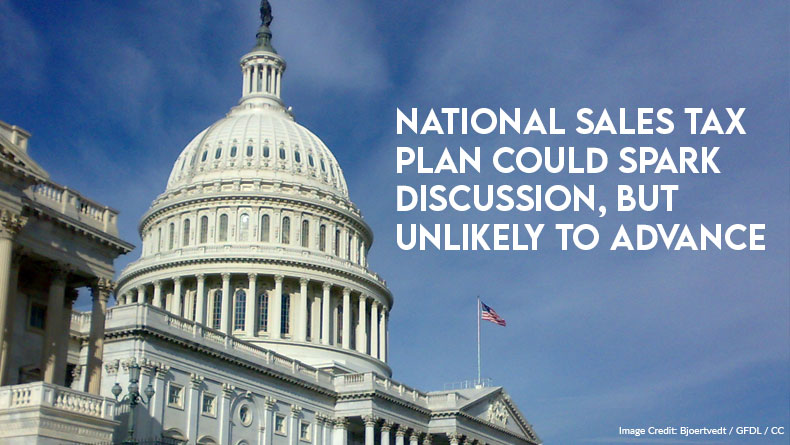Image Credit: Bjoertvedt / GFDL / CC
The Center Square [By Brett Rowland] –
A plan to overhaul the nation’s tax system is unlikely to advance this year, but it could help define the contours of the tax debate in the coming years.
The debate over that nation’s tax system is likely to pick up as lawmakers prepare for 23 individual and business tax provisions in the 2017 Tax Cuts and Jobs Act to expire on Dec. 31, 2025.
U.S. Rep. Earl “Buddy” Carter, R-Georgia, introduced the Fair Tax Act, earlier this year to replace the existing tax code with a national consumption tax.

The legislation would eliminate the national income tax and replace it with a 23% national consumption tax. It would eliminate existing income taxes, payroll taxes and estate and gift taxes. The national sales tax rate could be adjusted after 2025. Consumption business, export and investment would be exempt. U.S. residents would get a monthly sales tax rebate based on family size and federal poverty guidelines.
The plan further calls for states to administer, collect and remit the sales tax to the U.S. Treasury. It would eliminate funding for Internal Revenue Service operations after fiscal year 2027. And it would terminate the national sales tax if the Sixteenth Amendment to the Constitution, which authorizes an income tax, is not repealed within seven years of enactment.
The proposal isn’t new. Republicans have introduced it every year since 1999 when it was put forward by former Georgia Congressman John Linder. It has never advanced to a floor vote.
However, this year, the national sales tax plan is getting renewed attention after a deal between House Speaker Kevin McCarthy and the House Freedom Caucus. Even still, it might not pass the House Ways and Means Committee,
“The sense that I get is that it probably would not pass the committee,” said Garrett Watson, a senior policy analyst at the Tax Foundation, an independent tax policy group in Washington D.C. “So I guess the big question is will Rep. Carter and other supporters want to have a vote for anyway, even if they think it will fail?”

Watson said the 23% sales tax rate included in the bill would be higher.
“If you want an apples-to-apples comparison with the way sales taxes are usually presented, it’s closer to 30%,” he said. “So it’s effectively a 30% sales tax nationally and that will be levied on top of state sales taxes and other taxes at the state and local level.”
The trade-off would be the elimination of federal taxes.
“You would not need to file a return,” Watson said.
The plan would have wide-ranging implications, not just for the more than 83,000 people who work in tax preparation, according to the U.S. Bureau of Labor Statistics. It would also do away with the Internal Revenue Service, a federal agency that spent $13.7 billion for overall operations in fiscal year 2021 and had 78,661 full-time equivalent positions to collect more than $4.1 trillion in gross taxes and process more than 261 million federal tax returns.
“It’d be a massive change from our current system,” Watson said. “Having to repeal the existing system and then devolve all the IRS functions down at the state level will be a really big lift overall. And of course, there’s going to be other issues that come up that we’re not even expecting.”

Such a significant overhaul of the tax system would make way for a host of new political discussions about the nature of a consumption tax and how it would be applied. Those issues alone could sink the proposal.
“The massive change all at once plus skepticism about the value of this particular design will make it very unlikely,” Watson said.
The proposal could contribute to conversations about the nation’s tax code in the coming years.
“A bigger discussion over the next couple of years will be about more incremental reforms, because, for better or worse, we’re running into, at the end of 2025, a lot of tax changes because of the 2017 tax law. Individual tax cuts will all expire at once. So it’s one big tax cliff,” Watson said. “And while we make decisions one way or the other about what to do about it, it’ll be the start of that broader conversation.”



